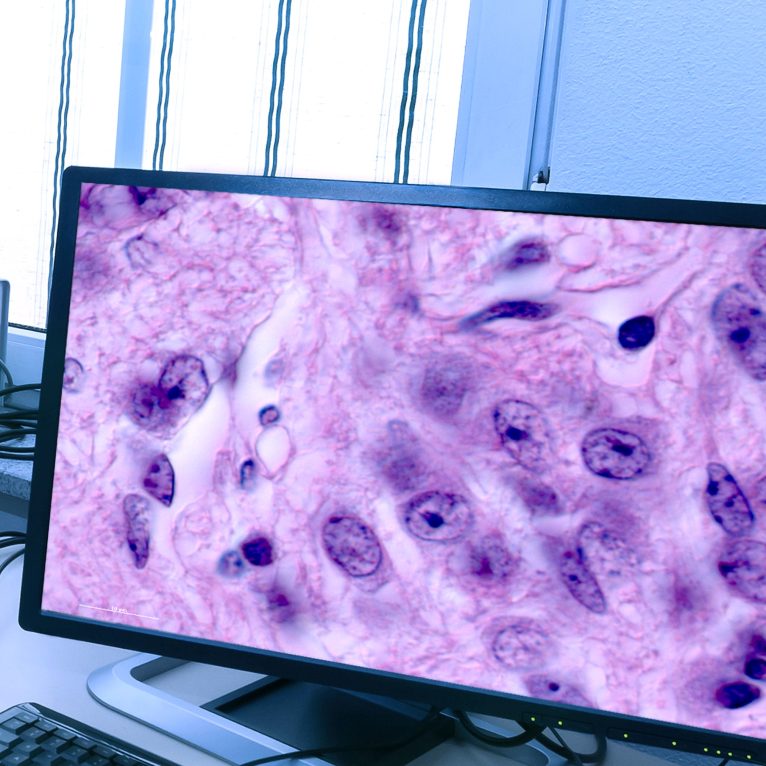
Written by

Cranfield, UK, 1st February 2024, Written by Imogen Fitt –
Hello LinkedIn Community! The digital pathology community has had a great start to 2024, below are a few news pieces that caught my eye recently:
- Although it was in December, Bigpicture released an interesting article on its use of DICOM as standard of choice. For those unaware, Bigpicture is a consortium (established in February 2021) to develop a repository for the sharing of pathology data. The project was awarded €70M and brings together a mixture of academics, healthtech vendors, public organisations and pharma companies. Of note, the initiative transforms its images to DICOM post-acquisition and contributors have managed to improve the software employed to do this significantly, resulting in a reduction of processing time from 4m/slide to 10s! Quite an achievement considering the large volume of images the consortia is hoping to collect… DICOM is quickly gaining popularity as a standard for pathology and this article highlights this progress.
- Aiforia Technologies announced it had signed a licensing agreement with the Mayo Clinic to commercialise an AI model to predict colorectal cancer recurrence. This kind of prognostic AI is particularly valuable as it informs treatment pathways rather than just identify the presence of cancer. More interesting was Jukka Tapaninen‘s comment which revealed: “this is an example of many similar AI model co-development projects, which are ongoing with the Mayo Clinic and other partners.” There are so many potential use cases for AI in digital pathology that developing multiple products simultaneously can be a costly and time-consuming endeavour – so partnering with experts at academic institutions could be a promising way to expand the company’s AI portfolio quickly. This comes with the caveat of being wary of the terms associated with these kinds of deals, which can be tricky to pin down, in addition to the fact that regulatory clearance still needs to be achieved before clinical impact can be established at scale!
- Next, it’s well known that the UK is one of the most advanced markets globally for DP due to an abundance of recent funding. Commitment to digitisation was further renewed this January as the Department of Health and Social Care’s announced it is taking forward National Screening Committee (NSC) recommendations to allow the expanded use of digital pathology across the NHS for second opinions and off-site work. This will be designed to help support the diagnosis of breast, bowel, and cervical cancers – and is a strong indication of further investment to come! I’d note that all three use cases also have strong potential for AI pilots too.
- Paige this month released a product developed from the company’s Foundation Model, Virchow. Built as part of its partnership with Microsoft Research, the app detects cancer across >17 tissue types. Even more interesting was the comment at the end of the press release by Razik Yousfi which alluded to the company combining the results of the Foundation Model (a form of genAI) with multimodality data (like genomics, radiology ect) to gain greater insights! Further evidence of prominent vendors turning their attention towards more prognostic products… To chat more on the technical and practical implications of this in comparison to the rest of the market drop a note to either myself or Vladimir Kozynchenko, our resident GenAI expert!
- Akoya Biosciences, Inc. has announced it now has a license and distribution agreement with Thermo Fisher Scientific which enables Akoya to market its spatial biology solutions (PhenoImager systems and PhenoCode reagents) with ThermoFisher’s ViewRNA in situ hybridization assays for detection of protein and RNA biomarkers in tissue samples. As a leading vendor in multiplex imaging providing access to an expanded range of assays from a dominant vendor like ThermoFisher enables the company to promote the use of its systems in further settings. This aligns well with its previous strategy, as individuals at the company have alluded to the fact that it’s approach to the market involves offering prospective customers as much flexibility as possible, whether through partnerships with microscope vendors like Zeiss, or establishing new agreements like this.
- Next, Techcyte has partnered with the Mayo Clinic Health System! The partnership involves building an anatomic digital pathology software platform, indicating Techcyte is moving into that domain. I’m expecting cytology to increasingly start overlapping with the anatomic space over the next year, as multiple tenders in markets have started to request z-stacking from their scanner suppliers…that’s sure to shake up competitive dynamics!
- A little more indirect, but I noticed that Sagimet Biosciences in a recent press release published positive results from a Phase 2b clinical trial for a drug to treat NASH. This sparked my attention particularly because the end-of-trial biopsy was assessed by a central pathologist using AI-based digital pathology. (HistoIndex was the vendor cited during the press release.) We already know that DP-related endpoints were a hot topic for AI in pharma, and this is a nice example of such an approach being publicised!
- Medica Group, a provider of teleradiology solutions has launched a ‘digital pathology service’. The lab is using 3DHISTECH – The Digital Pathology Company‘s P1000 scanner provided by Epredia. Teleradiology is already a bustling market worth >$2Bn – just ask Matthew Watson – and recently many vendors have been eyeing up their next digital opportunity. I’m expecting more announcements like this throughout the year…
- After that, Motic Digital Pathology recently selected Applied Spectral Imaging (ASI) as its Joint-Venture partner for integrating its Whole Slide Images through ASI’s HiPath Pro and PathFusion platforms. Motic has stayed focused recently on its scanner and telepathology product lines, so partnering with ASI provides it’s customers access to the latter’s computer-aided and AI-powered software, whilst concurrently allowing ASI to target a much broader set of customers in DP.
- Another announcement from Techcyte, this time signalling entry into cervical cytology… In partnership with Becton, Dickinson and Company Techcyte will offer a complete solution (although there is no mention of scanner provision), representing a significant foot in the door that the company now possesses into cytology labs! The solution will be AI enabled, and as mentioned in a recent insight I predicted strong momentum for digital cytology this year, so it’s nice to see developments coming so quickly!
- Lastly, PathAI announced it had added six additional oncology indications for PathExplore, its AI panel for spatial analysis of the tumour micro-environment. Human interpretable features (HIFs) will now be available across 14 oncology indications in total to aid drug developers. Whilst PathAI has made movements in the clinical domain recently, this announcement shows it certainly isn’t ignoring it’s existing business for life sciences.
That’s all for now, but as always feel free to comment if I’ve missed anything!
If you have any questions about these developments, or any of our reports (details below) and services, do feel free to drop me a message to set up a call.
Related Research
Digital Pathology Market Intelligence Service – World – 2023
Signify Research’s Market Intelligence Service provides a rolling 12-month coverage of the global Digital Pathology market. The service is composed of four deliverables:.
The service is designed to enable you to:
- Inform product investment and business strategy
- Evaluate the ever-changing competitive landscape to assess the impact of associations and select potential partners
- Acquire a holistic view of the nuances between different pathology research and clinical markets
- Understand adjacent markets such as enterprise imaging, laboratory information systems and the influence these will have on Digital Pathology
For any further questions or samples of the service contents, do drop me a note.
Did you find this roundup useful? Subscribe to Signify Research Ltd‘s monthly newsletters to get immediate access to some of our more in depth market insights.
About Imogen Fitt
Imogen joined Signify in 2018 as part of the Healthcare IT team. She holds a 1st class Biomedical Sciences degree from the University of Warwick where her studies included molecular biology and pharmacology. Since joining the team Imogen has studied the medical imaging software and hardware markets and is now expanding Signify Research’s Diagnostics and Lifesciences coverage.
About the Diagnostics and Lifesciences Team
The Diagnostics and Lifesciences team provides market intelligence and detailed insights on the multiple healthcare technology markets where the clinical world intersects with the preclinical. Our areas of coverage include digital pathology, laboratory information systems, clinical Real-World Data (cRWD) platforms, oncology information systems, tumour board software, oncology decision support software and radiotherapy IT. Each report provides a data-centric and global outlook of its markets with granular country-level insights. Our research process blends primary data collected from in-depth interviews with healthcare professionals and technology vendors, to provide a balanced and objective view of the market.
About Signify Research
Signify Research provides healthtech market intelligence powered by data that you can trust. We blend insights collected from in-depth interviews with technology vendors and healthcare professionals with sales data reported to us by leading vendors to provide a complete and balanced view of the market trends. Our coverage areas are Medical Imaging, Clinical Care, Digital Health, Diagnostic and Lifesciences and Healthcare IT.
Clients worldwide rely on direct access to our expert Analysts for their opinions on the latest market trends and developments. Our market analysis reports and subscriptions provide data-driven insights which business leaders use to guide strategic decisions. We also offer custom research services for clients who need information that can’t be obtained from our off-the-shelf research products or who require market intelligence tailored to their specific needs.
More Information
To find out more:
E: enquiries@signifyresearch.net
T: +44 (0) 1234 986111
www.signifyresearch.net
